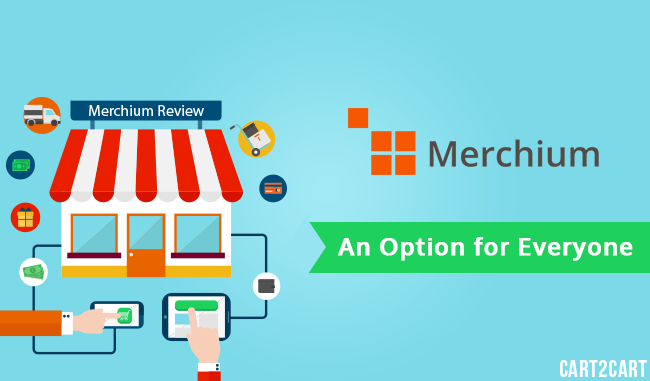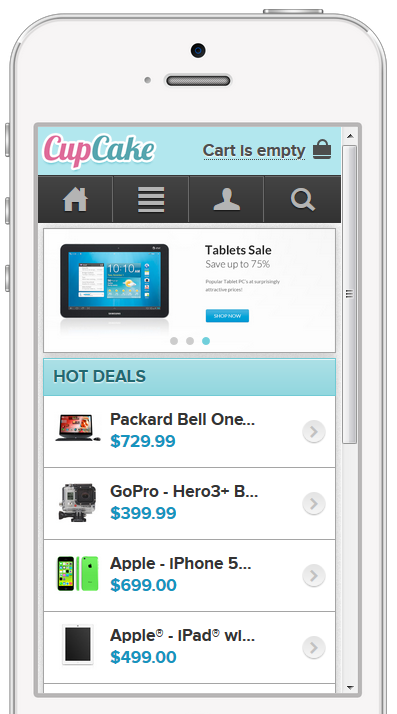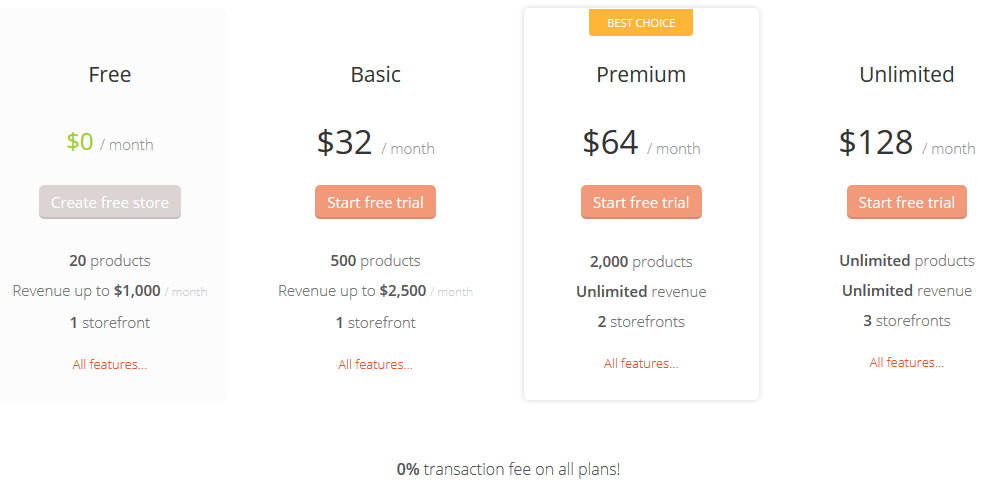
The market of SaaS shopping carts seems to have plenty of dominant solutions that control a major chunk of the e-Commerce market - Shopify, Bigcommerce, 3dcart, Volusion and some others. That doesn't stop new players from entering the competition, however. Some of them fail while others keep being promising, as Prestashop Cloud and Merchium are.
The second one, actually, will be a the subject of our today’s overview. Having a catchy name and suspiciously familiar logo, Merchium emerged in the world of e-Commerce around 2015 and, during its active period, initially acquired thousands of customers, focusing on a local market only.
So, what are the prospects of this promising solution and how can it oppose to competitors? Look for the answers in our Merchium review.
Brief Description

Merchium is a full-featured e-Commerce solution based on CS-Cart platform, and able to function independently or integrated with a Facebook page, WordPress blog, Joomla, Wix, Weebly, or any custom website. Actually, it copies all the advanced features of CS-Cart with one main difference - Merchium is hosted.
Being an Australian startup initially, the software was almost entirely built by Simbirsk Technologies (Simtech), a Russian company behind CS-Cart. That mostly explains all the similarities the platforms both possess, including a familiar logo of “cubic” shopping cart. For its part, Australian side looks after operations for the Asia-Pacific region, mostly sales, marketing, and strategy.
Another interesting thing about Merchium is the fact that it was developed in partnership with Yandex, #1 in Russia and a significant player globally. The result of such cooperation will be a deep integration with Yandex services, somewhat similar to Google’s ones. This feature, however, only makes sense when you’re aimed at the market of Russia or Eastern Europe.
Merchium Features
Easily Customizable
As a pleasant exception among hosted solutions, Merchium offers a high level of design flexibility with no HTML or CSS skills required. It has it’s own on-site visual editor that easily lets you change the color scheme of a storefront, backgrounds, fonts, and many more.
Also, since Merchium can be easily pinned right into any custom website, you can create a specific layout and choose a style for every location you have a storefront at. Thus, your store is guaranteed to fit perfectly wherever you need: WordPress, Joomla, Wix, Weebly, a Facebook page, company's website, and so on.

Mobile Friendly
Of course, Merchium has a responsive design. In a pursuit of creating a top-notch UX, the solution was designed with a touch interface in mind, utilizing familiar touch gestures. With the storefront developed by Twigmo absolutely from scratch, shopping cart looks stylish and convenient on mobile devices of any size.
Facebook Integratable
Merchium allows to increase your sales by going multichannel. The tremendous potential of Facebook will work for you with the ability to embed the store right into a personal Facebook page. Your catalog and orders will be immediately synchronized across all your storefronts, giving you another effective way to reach the customers. Getting social is now easy!
Global Market Targeted
Is the local market too tight for you? Merchium is ready to help you go global effortlessly, supporting dozens of payment gateways straight out-of-the-box and accepting payments with credit cards, PayPal, and other popular options.
Integrated with such shipping services as FedEx and USPS, Merchium accurately estimates shipping rates on the go. Also, the solution is localized into a dozen of languages and easily lets your customers switch between currencies with real-time prices calculation.
Prices
**Note on Historical Pricing (October 2025):** The following pricing information reflects Merchium's business model when it was an active platform. As of today, Merchium's services are no longer actively available for new subscriptions or migrations. This section is retained for historical context.

Historically, Merchium's pricing policy was democratic. It featured several offers, from a free tier (a permanently functioning store, not merely a demo) to an Unlimited plan. For example, a Premium plan at a specific cost per month was considered a beneficial solution for small online retailers, and an Unlimited plan, while more expensive, served as an optimal choice for middle-sized stores.
A notable feature of Merchium, unlike some other hosted platforms, was its 0% transaction fee on all plans. This policy contributed to transparent pricing, meaning that a chosen plan's monthly fee was typically the only cost incurred.
Details regarding specific features provided by each plan are now historical and not reflective of current market offerings.
Prospects of Merchium
From beginner to a pro, Merchium was an option for everyone. Having such important competitive advantages as 0% transaction fees and easy multi-channel commerce, it became actively noticeable on the market of hosted solutions during its operational period.
Historically, Merchium aimed to deploy broad marketing campaigns to grow its client base across the Asia-Pacific and the United States. With its strong initial performance in the local Russian market, the platform was envisioned to become an influential player of global scale, much like CS-Cart. However, its market presence has since transitioned.
In its active period, Cart2Cart provided solutions for those looking to leverage Merchium's platform. At its peak, Cart2Cart supported an automated Merchium migration from many popular shopping carts, facilitating the transfer of products, categories, customers, orders, currencies, taxes, and other entities in a straightforward manner, requiring no advanced programming skills.
Willing to try everything out beforehand? Start with an absolutely free Demo Migration!
Monthly Update – October 2025
As the e-commerce landscape continues its rapid evolution into October 2025, a critical trend for online merchants is the strategic embrace of headless commerce architectures and AI-powered customer engagement. Modern shoppers expect highly personalized experiences, instant gratification, and seamless interactions across multiple touchpoints. Legacy systems often struggle to deliver this agility. Adopting a headless commerce approach allows businesses to decouple the front-end presentation layer from the back-end e-commerce platform, enabling unparalleled flexibility in design, faster content delivery, and easier integration with emerging technologies like voice commerce and AR/VR shopping. Simultaneously, AI is transforming customer service, product recommendations, and inventory management, moving beyond simple automation to predictive insights and truly intelligent interactions. Store owners should evaluate their current platform's capabilities to support these advancements. Investing in a future-proof solution that facilitates such integrations is no longer a luxury but a necessity for competitive advantage. This approach ensures scalability, enhances customer lifetime value, and prepares your store for the next wave of digital innovation.
For more details, explore our FAQ section or schedule a call with a migration expert.





